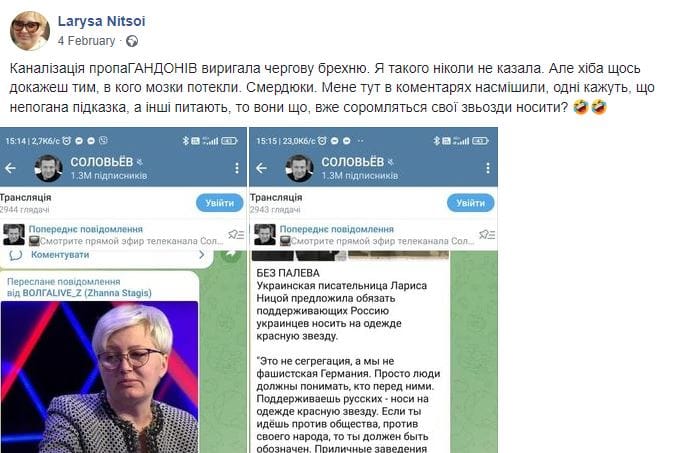Social media users were outraged by an alleged proposal by Ukrainian writer Larisa Nitsoy, who reportedly suggested that all Ukrainians supporting Russia should sew a red star onto their clothes. We fact-checked the claim.
In early February 2023, Telegram channels started sharing a quote from Ukrainian writer Larisa Nytsoy, apparently proposing that Ukrainians who share pro-Russian views wear a red star on their clothes: "This is not segregation and we are not Nazi Germany. It’s just that people need to understand who is in front of them. If you support the Russians, wear a red star on your clothes. If you go against society, against your people, then you should be marked. Decent establishments should not admit these people, be it a hairdresser’s, gas station or cinema. Let them feel like outcasts." Within a few days, about 200 Telegram channels shared the quote, including popular accounts such as "Solovyov" (230,000 views at the time of writing), "Mriya" (218,000 views), "Ukraina.ru" (183,000 views), "Sheikh Tamir" (153,000 views). The news was also picked up by media outlets like NTV, Komsomolskaya Pravda, Tsargrad and News Front.
It was not the first time that Ukrainian children’s writer Larisa Nitsoy had made headlines in the Russian press. In August 2018, Komsomolskaya Pravda reported that Nitsoy had urged the government not to let children from the internationally-unrecognized, self-proclaimed republics of Ukraine’s eastern Donbas region into summer camps in Ukraine. In September 2018, Gazeta.ru reported that Nitsoy demanded Ukrainian Education Minister Lilia Grinevich be dismissed for recommending the use of "propagandist" Russian-language textbooks in schools. And in October 2022, Moskovsky Komsomolets reported that Nitsoy had decided to rename some of her fairytale characters that had previously had Russian-sounding names. According to Ukrainian media, Nitsoy has long been known for her vocal stance on protecting the Ukrainian language. She has been fighting against the use of Russian in Ukraine, even in everyday situations — she regularly posts on Facebook about her arguments with service industry employees who refuse to speak Ukrainian with her.
Larisa Nitsoy's suggestion to mark Ukrainians holding pro-Russian views caused another wave of outrage among the Russian audience. Social media users drew parallels with how Jews in Nazi-controlled areas during the Holocaust were required to wear similar yellow stars to be identifiable among the rest of the population. In September 1939, the German administration in a Polish town of Wloclawek ordered all Jews over the age of ten to wear an identification badge with the Star of David. There were heavy penalties for those caught not wearing it. The type of the badge varied from country to country, but the most common one was a yellow six-pointed Star of David with either "J" or "Jude" written on it. Nitsoy's proposal to force pro-Russian Ukrainians to also wear an identifying mark — a red star — on their clothes led the media to conclude that "Russians in Ukraine have long become 'Jews of the 21st century.'"
However, none of the reports we found online specified exactly where and when Notsoy voiced the suggestion. Google searches in Russian and Ukrainian did not return any results. In fact, a few days after the claim appeared in Telegram channels, Nitsoy posted on Facebook that she "had never said such a thing."

The earliest publication we found was published on February 1 on the "here is my Yandex wallet" Telegram channel, which was then reposted by larger channels without any reference or credit to the original source. Most of the reposts credited Zhanna Stagis as the reporter — the name taken from a publication about Larisa Nitsoy that was posted on the channel "VOLGALIVE_Z" (a regional bureau of a TV show "Solovyov Live"). However, in this case, the primary source of the publication is critical, because the "here is my Yandex wallet" channel is a satirical project, already well-known to the editors of "Proverenno" (fact-checks of several other posts by the channel are linked to in the "Read more" section below). According to the profile description, the channel posts "parody, political satire, only verified fakes." And judging by the comment section under the post about Nitsoy, even some of its subscribers have no idea it’s a satirical channel, and not a news outlet.
Therefore, it’s not the first time a story made up by the satirical "here is my Yandex wallet" channel has been mistaken for real news. In many respects, the Nitsoy story owes its million-user reach to TV presenter Vladimir Solovyov and his regional bureau team, who reprinted the “news” they saw on social media without mentioning the source or checking their facts.
Image credit: Social media
Satire
- Правда ли, что певица Монеточка поставила россиянам ультиматум: «Или я, или Путин»?
- Правда ли, что в Житомире памятник Пушкину во время сноса «убил» активиста?
- Правда ли, что Эстония запретила России приостанавливать договор СНВ-3?
- Заявляла ли премьер-министр Эстонии, что страна передала Украине истребители, которых у Таллинна нет?
- Правда ли, что польский премьер-министр призвал Зеленского временно передать Польше территории Западной Украины?
- Говорила ли глава Еврокомиссии, что не верит в причастность Белого дома к взрывам на «Северном потоке» из-за «безупречной репутации» США?
Если вы обнаружили орфографическую или грамматическую ошибку, пожалуйста, сообщите нам об этом, выделив текст с ошибкой и нажав Ctrl+Enter.






